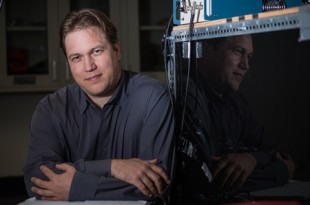David Ruth
713-348-6327
david@rice.edu
Jade Boyd
713-348-6778
jadeboyd@rice.edu
Rice’s Stephan Link honored for nanoscience research
The Welch Foundation honors ‘rising star’ with $100,000 Hackerman Award
HOUSTON — (Feb. 26, 2015) — The Welch Foundation today presented its prestigious Norman Hackerman Award in Chemical Research to Rice University scientist Stephan Link, who was named this year’s “rising star” for his pioneering contributions to the emerging field of nanophotonics.
Link received the award and an accompanying prize of $100,000 at a luncheon at the Texas Medical Center.
Link, associate professor of chemistry and of electrical and computer engineering at Rice, draws upon knowledge and techniques from chemistry, physics, engineering and mathematics to better understand how light interacts with nanomaterials. His research group uses single-molecule and single-particle spectroscopy to help decipher the physical rules that explain how light-activated “plasmonic” nanoparticles interact with one another and with their environment.
“Basic research is absolutely crucial for advancing knowledge,” Link said. “It is the foundation for all the applications that make life longer, better, easier. Mostly thanks to the Welch Foundation, we’re able to do this type of work in Texas, building on past insights to tackle bigger and bigger problems. It takes many different minds and expertise to come together to solve the harder problems — that’s where our collaborations and thinking outside the box are really important.”
Link wants to better understand how to use light to probe materials and initiate chemical reactions, which could ultimately prove useful in such diverse areas as cancer treatment, light displays, steam generation, energy-efficient catalysis and medical diagnostics.
The Welch Foundation, one of the nation’s largest sources of private funding for basic research, said the 2015 Hackerman Award pays tribute to Link’s “groundbreaking contributions in plasmonic nanomaterials and recognizes his leadership, creativity and commitment to science as demonstrated through his research and teaching.”
“Dr. Link’s colleagues have called him the ‘quintessential 21st-century physical chemist’ and an ‘unstoppable force,'” said Wilhelmina Robertson, chair of the Welch Foundation. “His commitment to expanding the borders of scientific knowledge to ultimately improve lives is exactly the kind of work this award was created to honor. His major research contributions make him a true ‘rising star,’ and we are eager to see what the future holds for him.”
Born in Germany, where he earned his undergraduate degree in chemistry, Link holds a doctorate from Georgia Tech and pursued postdoctoral research at the University of Texas at Austin. He joined Rice’s faculty in 2006 and has been a Welch Foundation principal investigator since 2007.
“Stephan asks cutting-edge questions and develops innovative experimental approaches to get answers,” said Peter Dervan, chair of the Welch Foundation’s Scientific Advisory Board. “He combines insights from basic research with practical applications to deliver important advances. He has a flair for effective collaboration and a knack for inspiring the best from his students. He is a wonderful teacher and mentor helping develop a new generation of scientists.”
In 2014, Link received the inaugural Outstanding Young Scientist Award from the NANOSMAT Conference. Other honors include the International Union of Pure and Applied Chemistry’s Prize for Young Chemists, the Oak Ridge Associated Universities’ Ralph E. Powe Junior Faculty Enhancement Award, the 3M Nontenured Faculty Award and the National Science Foundation’s CAREER Award.
The Hackerman Award is named in honor of Norman Hackerman, a noted scientist and former long-time chair of the Welch Foundation’s Scientific Advisory Board and a former president of Rice. The award is presented annually, when warranted, to scientists who are early in their careers and are conducting basic research in chemistry in Texas.
For more than 60 years, the Welch Foundation has supported basic chemical research in Texas through grants to researchers at colleges and universities, assistance for chemistry departments at smaller colleges and universities, funding of endowed chairs, an annual chemical research conference and a summer program for high school students, among other initiatives. The foundation also bestows the prestigious Welch Award for achievement in basic research in chemistry to benefit humankind.
For more information and a list of previous Hackerman Award recipients, visit www.welch1.org.
-30-
VIDEO is available at:
High-resolution IMAGES are available for download at:
https://news2.rice.edu/files/2015/02/0226_LINK-Hackerman-1-lg.jpg
CAPTION: Stephan Link
CREDIT: Jeff Fitlow/Rice University
https://news2.rice.edu/files/2015/02/0226_LINK-Hackerman-2-lg.jpg
CAPTION: Stephan Link
CREDIT: Jeff Fitlow/Rice University
Located on a 300-acre forested campus in Houston, Rice University is consistently ranked among the nation’s top 20 universities by U.S. News & World Report. Rice has highly respected schools of Architecture, Business, Continuing Studies, Engineering, Humanities, Music, Natural Sciences and Social Sciences and is home to the Baker Institute for Public Policy. With 3,920 undergraduates and 2,567 graduate students, Rice’s undergraduate student-to-faculty ratio is just over 6-to-1. Its residential college system builds close-knit communities and lifelong friendships, just one reason why Rice is highly ranked for best quality of life by the Princeton Review and for best value among private universities by Kiplinger’s Personal Finance. To read “What they’re saying about Rice,” go here.


